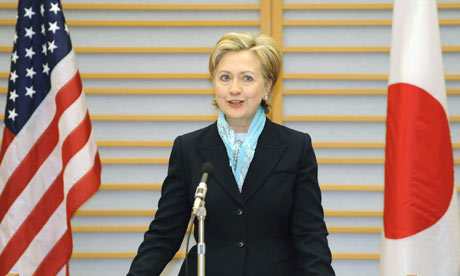
A few of my thoughts and opinions on what is lacking in current efforts to stop the North Korean quest for nuclear armament:
To put this into a little bit of perspective, let me refer you to this article from Al Jazeera that I think accurately shows just how troubling the rhetoric from coming from both sides of the Pacific Ocean is getting. While Hillary Clinton's pledge to defend South Korea and Japan against North Korean aggression sounds at least more sane than Pyongyang's promise of "merciless punishment" for any future Western interference, I can't help but notice how old-fashioned, childish, and ridiculous the whole situation is. It's high time our leaders stop acting like this is an episode of 24 and realize that words having meaning, and there are consequences to thinking that torturing the right people can make up for a lack of insight, sensitivity, and reevaluation of outdated foreign policy.
1. Lack of Moral Standing
The success of nuclear proliferation, disarmament, and the eventual banning of nuclear weaponry altogether relies on, in my opinion, the willingness of influential proponents including the United States to lead by example. Call me idealistic (or perhaps I'm merely being ultra-realist), but Washington has little basis from which to demand a halt to the North Korean nuclear program. The U.S. is the only nation to ever use nuclear weapons, and it chose to do so twice, both times against defenseless civilians. In more recent history, it has failed to repaint its foreign policy image as anything other than troublingly self-interested, while at the same time (perhaps in a related sense) dangerously inconsistent in the when-why-and-how of world policing. Why then are we surprised when countries choose not to take the ever-beneficent U.S. at its word when it says it is working for the well-being and freedom of others? The point being not that the U.S. is evil, but that its history and lack of concrete moral standing causes even its most honest efforts to be held suspect and fall impotent.
Leading by example also involves self-restriction. I whole-heartedly call not only for the end of the North Korean nuclear program, but also that of the United States. Cold War-esque military buildup is no longer a sufficient buffer, and continual armament only serves as provocation and a hindrance to stepping onto the moral high ground. Nuclear disarmament of the U.S. will be the first bold step towards proving to the rest of the world that this nation is a proponent of peace, not mutual destruction.
2. Burning our Bridges
The People's Republic of China is one of the few nations in the world with a semi-open relationship with North Korea. While this relationship is still limited, it is a major mistake to continue burning bridges with China. Tiffs over big business and trade have caused a senseless riff in diplomacy. If the U.S. focused its efforts on bridging these gaps and touching up recent damages in its relationship with China through seeking, among other things, mutual cultural understanding, it will find itself a powerful and much-needed addition to allies in the region.
Embracing a Chinese ally in the North Korea situation would also create a crucial meeting point for important issues such as Taiwanese, Tibetan, and Uighur freedom. Along these lines, another important step towards finding common ground on these as well as the North Korean problem is a recommitment to the terms of the Shanghai communique. There is currently much uncertainty among the Chinese people as to whether or not the U.S. is seeking hegemony abroad. An added bonus to quelling these fears through an end of military aggression and halting our nuclear program would allow again, by means of taking the moral high ground, room to urge China to do the same. While I do not personally fear Chinese aggression outside its own borders, this move would most certainly not hurt.
3. The Sinking Ship
Above I have alluded to the major underlying problem of Washington's current foreign policy which will not cease in sabotaging efforts in North Korea and elsewhere until it is addressed, deconstructed, and revamped. The Obama administration, particularly Secretary Clinton and the President himself, need to realize that this is not World War II, this is not the Cold War, nor is this the Persian Gulf. Sovereign nations do not respond well to threats (empty or serious), nor are they comfortable with the U.S. continuing its role as world police (invited or not). The U.S. would do well in my opinion to take most seriously its role as a member of the United Nations and participant in various international treaties. Treaties have no pull and the UN is powerless as long as its most influential and respected members continuously lecture other nations about adhering to regulations they themselves regularly circumvent.
It seems to me that the New foreign policy of our age, if it is to be effective, should be characterized not by the power-grabbing, aggression, and threats of economic competition but rather by the friendship, understanding, and creativity of cosmopolitan cooperation.
